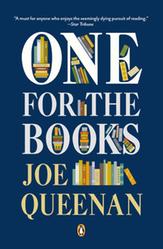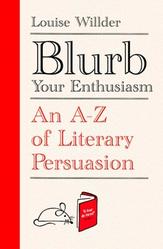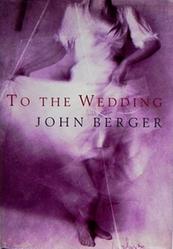From the moment I picked up your book until I put it down I was convulsed with laughter. Someday I intend to read it.
--Groucho Marx's blurb on the rear panel of Dawn Ginsbergh's Revenge by S.J. Perelman (Horace Liveright, 1929)
I've been thinking about blurbs, which are hard to avoid if you're a reader. There they are, right in front of you, every day. Blurbs tend to travel in groups, often vertically (a stack of book blurbs?), and to nest on packed bookshelves. For an individual title, the stack's numbers can vary from a single blurb on the front cover to three or four on the back. Ambitious blurbists will sometimes even include a few pages of them inside the book. Fellow writers' blurbs, reviewers' blurbs, publicists' blurbs. Do they all get read? I wonder.
Not long ago, Barbara Lane wrote in Datebook: "Blurb is such a wonderful word. It conjures up exactly what it is: a belch of praise for a book, generally found on the dust jacket, to lure the reader to purchase it. I must admit to reading blurbs when deciding whether to buy a book, but I am swayed only by plaudits from publications I trust or authors I greatly admire."
 Speaking for the opposition, Joe Queenan noted in One for the Books that "writers hate writing blurbs for strangers, because it forces them to read books they do not want to read, at a point when time itself is running out on them.... Purists can decode blurbs to see the procrustean contortions a writer had to put themselves through in order to be able to praise a friend without actually praising his book."
Speaking for the opposition, Joe Queenan noted in One for the Books that "writers hate writing blurbs for strangers, because it forces them to read books they do not want to read, at a point when time itself is running out on them.... Purists can decode blurbs to see the procrustean contortions a writer had to put themselves through in order to be able to praise a friend without actually praising his book."
I confess I enjoy tracing the six degrees of separation (often fewer than six) between blurberistas, as Queenan describes them, and the writers they plug.
In the Guardian last August, professional copywriter Louise Willder, author of Blurb Your Enthusiasm, shared some book trade secrets, including: "The chances are that you have read more blurbs on books than actual books. Perhaps you have even glanced at one I wrote: I've been a copywriter in publishing for 25 years, crafting those miniature stories that aim to distill a book's magic and connect with readers. Part compression, part come-on, blurbs can also, as I found when I wrote a book about them, open up a world of literary history and wordy joy."
 Among the many things she discovered is there "have always been blurb haters. J.D. Salinger refused to have any words on his book jackets other than the title and his name. Jeanette Winterson burned her own books on social media in 2021 because she hated the 'cosy little domestic' blurbs on their revamped covers. Joe Orton was sent to prison for defacing library books with, among other things, outrageous fake blurbs. A copywriter colleague of mine once had a blurb torn up in front of him by an irate editor, while another made him write 21 different versions for a popular novel."
Among the many things she discovered is there "have always been blurb haters. J.D. Salinger refused to have any words on his book jackets other than the title and his name. Jeanette Winterson burned her own books on social media in 2021 because she hated the 'cosy little domestic' blurbs on their revamped covers. Joe Orton was sent to prison for defacing library books with, among other things, outrageous fake blurbs. A copywriter colleague of mine once had a blurb torn up in front of him by an irate editor, while another made him write 21 different versions for a popular novel."
In his New York Times "On Language" column, William Safire observed in 1981 that a blurb "is an effusion, printed in an advertisement or on a book's cover, extolling the contents by a critic, a friend of the author, or if worse (worst?) comes to worst, the publisher.... I have often dreamt of supplying a blurb that goes: 'The book can be put down but the author cannot.' ''
He added that the coinage of the term blurb can be traced to Gelett Burgess, "a writer for Smart Set magazine, [who] came up with an idea in 1907 for a way to tout a book: He drew a picture of a simpering girl on his book's jacket and said that his book was beloved by Miss Belinda Blurb. Our girl Belinda has never been busier: Unforgettable. Gripping. Luminous. The best linguistic gift since the gift of speech."
The inaugural blurb (though it wasn't called that) in the U.S. apparently had a dodgy genesis. When the first edition of Walt Whitman's Leaves of Grass was published in 1855, Ralph Waldo Emerson sent the poet a letter that included the phrase: "I greet you at the beginning of a great career." Whitman subsequently had those words stamped in gold leaf on the spine of the second edition.
If you're desperate, Plot Generator manufactures blurbs. For my never-to-be-written crime novel The Boston Story (under the pseudonym Malcolm Canterbury), PG began with the question: "What would you do if you knew there were illiterate booksellers with shocking habits near the ones you love? The night of the conference changes everything for Samuel Emerson, a 55-year-old bookseller from Boston." PG also created a pair of blurbs. My favorite: " 'Never have there been more chilling villains than illiterate booksellers that plagiarize each other.' --the Daily Tale."
 My favorite blurb was Michael Ondaatje's literary blessing on the back cover of John Berger's 1995 novel To the Wedding: "In some countries it must still be the writer's role to gather and comfort... to hold and celebrate a moment before darkness. With To the Wedding John Berger has written a great, sad, and tender lyric, a novel that is a vortex of community and compassion that somehow overcomes fate and death. Wherever I live in the world I know I will have this book with me."
My favorite blurb was Michael Ondaatje's literary blessing on the back cover of John Berger's 1995 novel To the Wedding: "In some countries it must still be the writer's role to gather and comfort... to hold and celebrate a moment before darkness. With To the Wedding John Berger has written a great, sad, and tender lyric, a novel that is a vortex of community and compassion that somehow overcomes fate and death. Wherever I live in the world I know I will have this book with me."
Does he really still have that book with him, more than 25 years later? I suspect he does.

